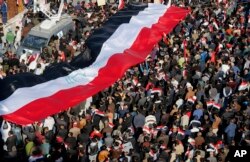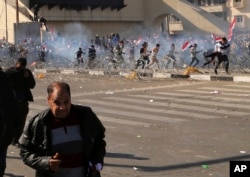Iraq’s mercurial Shi’ite cleric Muqtada al-Sadr urged his supporters to suspend a demonstration Saturday near Baghdad’s iconic Green Zone, after violent clashes that left at least four dead and 320 wounded, according to Baghdad’s governor.
Iraqi security forces fired tear gas at supporters of Sadr after reports they were trying to advance in the direction of the iconic “Green Zone,” where government institutions, including parliament and the prime minister’s office are located.
In later skirmishes, live ammunition reportedly was used, although it was not clear who was doing the firing.
Baghdad governor Ali al-Tamimi said in a statement that four people were killed and 320 wounded in the clashes that ensued, as protesters dispersed following a call by Sadr to pull back. Baghdad’s security operations command also reported that one of its men was killed and seven wounded.
Sadr supporters broke into the Green Zone last year, ransacking parliament and harassing lawmakers.
A Shi’ite cleric who supports Sadr told Iraqi media that demonstrators were not trying to harm anyone or disturb government institutions this time around.
Demands
He claims that Sadr’s partisans are protesting corruption in the government, and the electoral commission, and are not trying to storm the Green Zone, but will continue protests until the members of the electoral commission are removed from their posts.
Sarbast Mustapha, who heads the electoral commission, remained firm, however, telling Iraqi media that he would not be influenced by popular pressure.
He says that he will not step down, except at the request of parliament, and he urged security forces to protect his offices and employees. He urged everyone to abide by the law, since the electoral commission was an institution based on law.
Mustapha insisted the protests are merely an “internal dispute among Shi’ite [political] parties,” but warned that [upcoming parliamentary) elections could be suspended if the protests continue.
Iraqi Prime Minister Haidar al-Abadi issued a statement Saturday, reacting to casualties among protesters, insisting that Iraqis had the “right to protest peacefully.” He also called for the setting up of a commission to investigate what happened.
Member of Parliament Ali Budeiri, who belongs to Muqtada al-Sadr’s movement, insisted that members of his group would not back down on their demands.
He insists that all Iraqis are demanding what he calls “deep reforms,” and he goes on to insist that the people are the source of all (political) power.
Sadr, who has strong ties to Iran’s clerical establishment, held numerous protests outside the Green Zone last year demanding the resignation of various government ministers, and over-running the Green Zone, before withdrawing.






